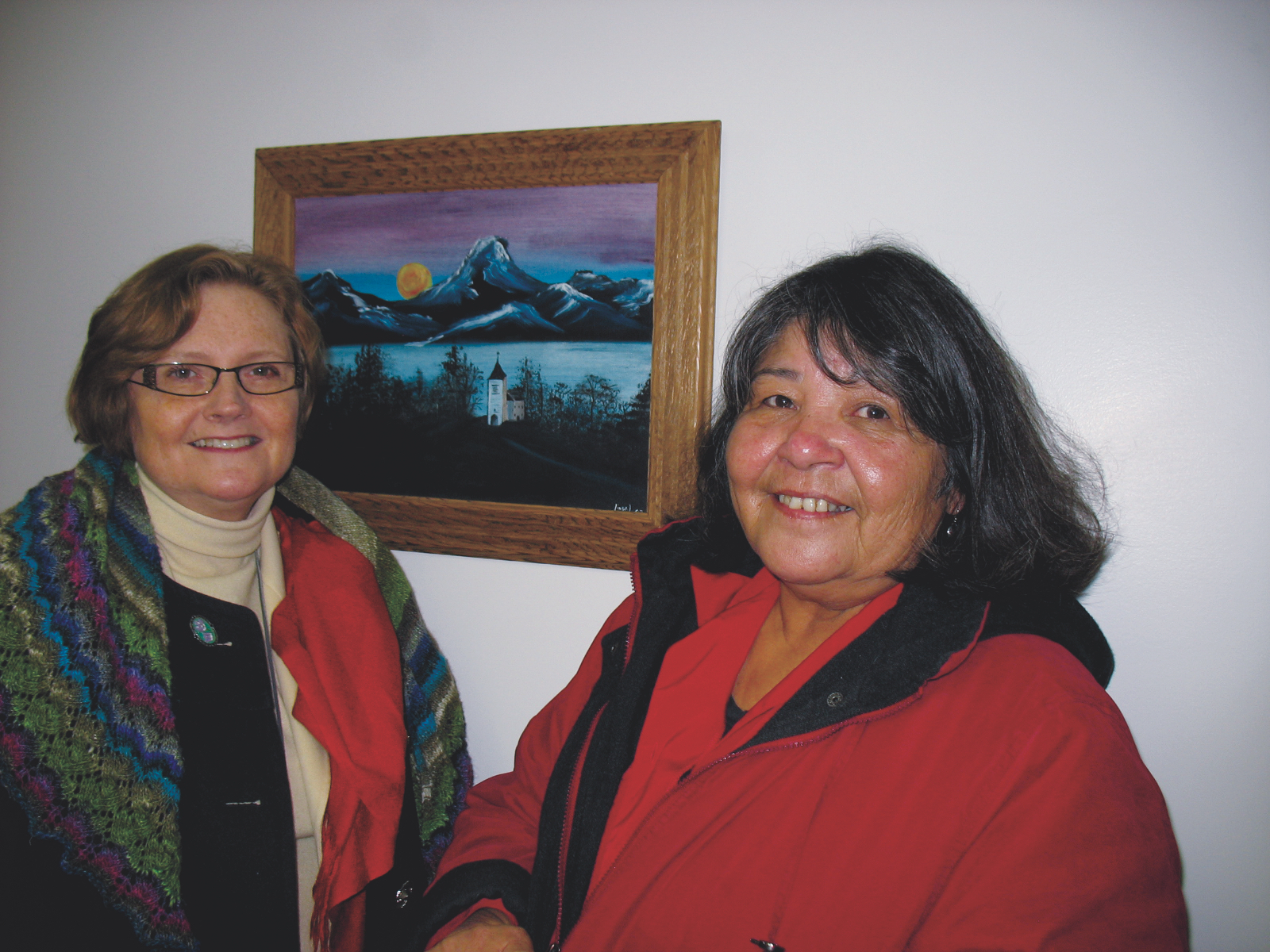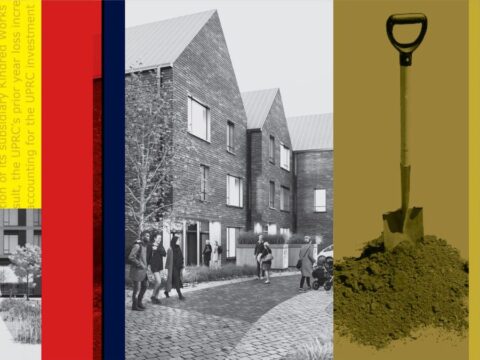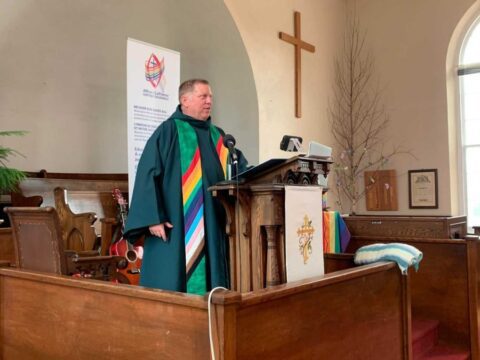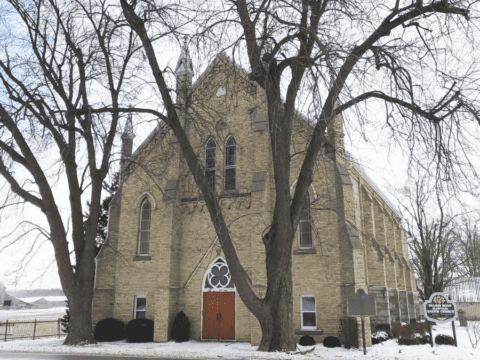The rain-soaked Manitoba prairies unfold outside the windows of Via Rail’s cross-country train as Moderator Mardi Tindal tells me that, in a way, she’s “just substituted train stations for airports.” The moderator’s Spirit Express is about travel that leaves a smaller carbon footprint. But it is also about how that footprint is connected to the soul.
Arriving alone with a bulging backpack after checking her suitcases, the spiritual leader of The United Church of Canada joins me at Winnipeg’s soaring 1911 beaux-arts-style Union Station. The economy-class waiting room has a patina of faded elegance. But the station is more crowded with the ghosts of bygone travellers than interprovincial commuters. Our train, the Toronto-to-Vancouver Canadian, feels like a vehicle for nostalgic tourism rather than green efficiency; a couple of economy passenger coaches are hitched to more than a dozen sleeping, dining and dome sightseeing cars, filled with mainly American tourists.
You may unsubscribe from any of our newsletters at any time.
Joined by Mike Milne of The Observer as the train leaves Winnipeg for Melville. Here we come, SK conference! — Moderator on Twitter, Oct. 25, 11:32 a.m.
The Canadian is slower than travel by automobile and less convenient than air. It only runs three days a week and doesn’t go into Regina. But if the Spirit Express is more about making connections of the human kind, then the train is ideal.
The moderator delights in telling a story about meeting an Ottawa-based engineer in the dining car shortly after boarding the train in Foleyet, Ont., following a visit to Manitou Conference. Spurred by her faith and concern for the environment, the engineer has done all her business travel by train for the past four years.
At lunch, en route to Melville, Sask., where we will get off the train and the next day catch a ride two hours south to the small town of Kipling, Sask., the moderator and I meet a pleasant couple from Utah who are leading a group from Washington State to Vancouver. They express concern about the widespread loss of passenger rail routes across North America.
Before and since her election, Tindal has been clear that environmental issues — or “care of Creation,” to use spiritual terms — top her agenda. Moderators are also expected to visit every Conference during their term. And so, the Spirit Express was conceived as an opportunity to share the moderator’s project while she visits the whole church.
Tindal was in British Columbia for meetings and events last spring, covering part of her visiting duties. She plans to visit Bay of Quinte, Montreal and Ottawa, Maritime and All-Native Circle Conferences by train in the spring, and Hamilton and London Conferences in the fall. Only Newfoundland and Labrador Conference is inaccessible by train.
So far, the Spirit Express format involves a mix of congregational and community events, plus town-hall discussions open to the public.
By the time the first leg of the Spirit Express returns to Toronto from Edmonton in mid-November, Tindal will have taken part in 52 events or gatherings, including about six town halls. There are visits with a 101-year-old layperson in Winnipeg and with Canadian Girls in Training in Regina. There is the dedication of a sacred space at an eco-centre in Craik, Sask., and a meeting in Calgary with the Canadian Association of Petroleum Producers.
Tindal is good at issuing pleas on behalf of God’s Creation without becoming strident or confrontational.
Quoting one of her mentors, Quaker author Parker Palmer, the moderator says she’s not here to “fix, save, advise or set anyone straight.” Even with the association of petroleum producers, which may not share her passion for limiting carbon dioxide emissions, she says, “I wouldn’t get into arguments. We all have our own work to do.”
If rail travel in Canada is somewhat retro, the moderator’s communication strategy is up-to-the-minute. She watches her BlackBerry closely for mobile phone service as we cross the western hinterland and sends out updates on Twitter when she can. Her blog (on wondercafe.ca and united- church.ca) is also updated regularly, offering more detailed thoughts.
SK means Land of the Living Skies; most sand dunes in Canada.
— Moderator on Twitter, Oct. 25, 7:34 p.m.
A former General Council staff person, Christian educator, television host and retreat centre director, Tindal is a great communicator. She excels at finding meaning and hope, then sharing it with those she encounters. She doesn’t promise to have all the answers but to keep asking questions. “I am blessed myself by open, honest questions, because I don’t have it all together. None of us is in a position where we don’t have things to learn. . . . We need one another in the discussion, this conversation, in order to find a sustainable way forward.”
That way forward, Tindal says, through the healing of soul, the healing of community and the healing of Creation.
Arrived into Melville SK early last night. So far the Spirit Express has arrived early into every train stn!
— Moderator on Twitter, Oct. 26, 12:09 p.m.
At just under 4,600 people, Melville is Saskatchewan’s smallest city. Once a busy junction on the Grand Trunk Pacific Railway, the town now has a railway museum and a restored clapboard station, relocated from the nearby town of Duff. Its own stucco station is crumbling behind orange plastic fencing while it awaits restoration. The small clapboard hut currently in use is unstaffed but a good place to huddle out of the wind.
Weather that wouldn’t slow down a train, however, comes close to foiling the Spirit Express at its next stop.
Awoke to white ground cover & it’s still snowing! Forecast is for 10-20 cm with wind. Heading off to Kipling early. — Moderator on Twitter, Oct. 26, 12:12 p.m.
After a slow drive on wintry roads to Kipling — the town that famously traded a house in 2006 to complete a chain of Internet swaps that began with a red paperclip — the moderator’s first Saskatchewan town-hall meeting is hosted by Kipling and Windthorst United churches. Stormy weather, later dubbed a “weather bomb” for its intense low- pressure centre, fails to deter about 100 people from attending the event, proving that rural Saskatchewan is home to plenty of faithful and committed people.
Tindal, raised on a farm, tells them she’s not just another expert from the city with all the answers. She’s here to offer wisdom but also to learn.
There’s a delicious potluck supper and, after cleanup, reflections from Rev. Janet Sigurdson on the Creation-based teachings of First Nations, and from Wayne Lewis of Windthorst on agricultural connections. Last summer had too much rain when it wasn’t needed, he says, and too little when it was.
“You’re people of the land,” replies Tindal, “so you know things are out of whack. We know that Holy Spirit moves in mysterious ways and that we are not in control of what is and will be, but we are learning about our effects and our contribution to the destruction of the web of life.”
Discussions range from the health risks of agricultural chemicals to the effects of truck transport to the value of Facebook in reaching young people. There are gifts and laughter and everyone heads home early. The storm quashes plans to reach Regina that night.
Great Town Hall turnout and spirit in Kipling last night despite blizzard conditions. Stayed o/n with the Janet & Jerry Kessler — Angels!
— Moderator on Twitter, Oct. 27, 2:17 p.m.
Even in daylight, the roads are treacherous thanks to slush that has frozen into ice and 85 km/h winds that have piled up the 20 centimetres of snow in all the wrong places. Aside from our fuel-efficient Toyota sedan, the only vehicles in sight are four-wheel-drive trucks — high-carbon emitters perfectly suited for rural Saskatchewan winters.
Safely in Regina now thanks 2 Bill Doyle’s careful driving in wild weather — and kind truck drivers who got us out of the biggest hwy drifts.
— Moderator on Twitter, Oct. 27, 2:24 p.m.
Regina’s roads are also icy. But a city- wide environmental fair goes ahead as planned at Lakeview United. Various groups have set up over a dozen displays promoting car sharing, climate change research, solar panels, electricity conservation, greenhouse gas reduction, power from methane gas, and energy-efficient retrofitting of church buildings.
Despite a low turnout due to weather, discussions are had, environmental solutions are proposed and the moderator speaks words of encouragement.
“From digging into community gardens to digging into public policy,” she tells them, “people are making common cause for the sake of the Earth.”
From here, the moderator heads to Kindersley, Sask., where St. Paul’s United has already completed enough energy-saving renovations to offset the carbon emissions generated by her first year of travel. As Tindal explains, healing Creation means “living consciously about our decisions about travel, our buildings, our diets and our votes.”
Congregations, she says, have to “face squarely the reality of what our buildings are doing and what our Christian calling is about. . . . So yeah, we’re tired of bake sales to keep the roof repaired. And yet, in this is a life-giving opportunity to rediscover what it is to be faithful — and to have the joy of that.”
***
This story first appeared in The United Church Observer’s January 2011 issue with the title “On the right track.”














